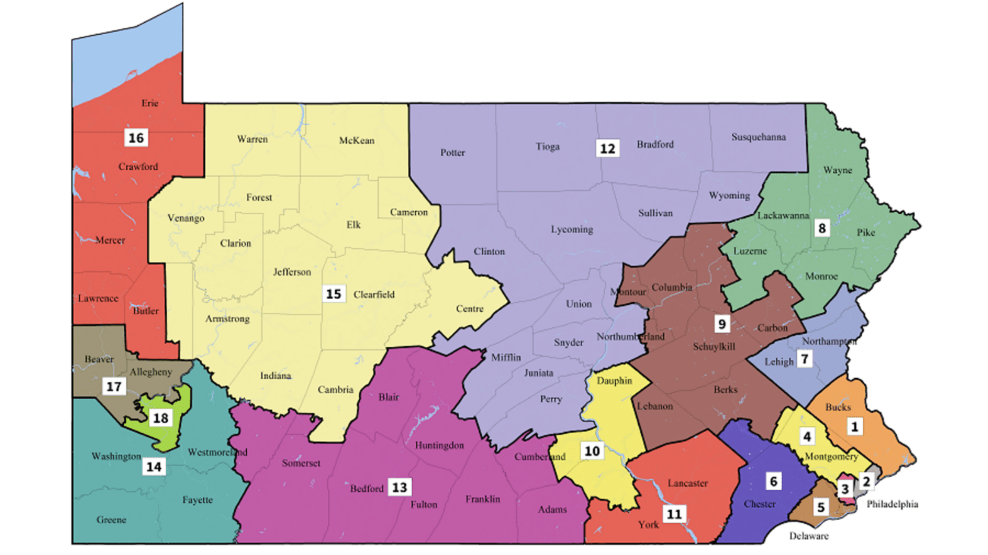
The new congressional map enacted by the Pennsylvania state supreme court.Pennsylvania Supreme Court/www.pacourts.us
The Republican leaders of the Pennsylvania legislature are asking the US Supreme Court to toss out a new congressional map that would likely cost the party several seats in the November midterms. Their appeal is a longshot, but if they succeed, it could help Republicans hold the House of Representatives in 2018.
Last week, the Pennsylvania supreme court enacted congressional district lines drawn by a court-appointed redistricting specialist from Stanford Law School. The decision followed a legal challenge to the state’s Republican-drawn map. Unlike the previous map drawn by Republicans in 2011, the court-enacted one did not give the GOP a major advantage—under the old one, Republicans had consistently won 13 of the state’s 18 congressional seats, even when Democratic candidates cumulatively won more votes. In their appeal, Pennsylvania Senate President Pro Tempore Joe Scarnati and House Speaker Mike Turzai argue that the state supreme court usurped the legislature’s power to draw political maps.
This is the Republicans’ second attempt to draw the US Supreme Court into the case and avoid a map that is more friendly to Democrats. The two Republican leaders previously appealed to the US Supreme Court matter last month, before the court’s replacement map was implemented, but Justice Samuel Alito, who oversees appeals from states in the Third Circuit, denied their request. This time, they are returning with the new map in place and essentially the same arguments. Election law experts are skeptical that the Supreme Court will decide to take up the case.
In January, the Pennsylvania supreme court ordered the state’s legislature and governor to agree to a new map and said it would impose its own map if they failed to agree on one by February 15. Turzai and Scarnati drew a map but did not put it to a vote by the legislature. The state’s Democratic governor, Tom Wolf, rejected it as another pro-Republican gerrymander, and last week the court imposed its own map. Now, in addition to arguing that the state’s top court overrode the legislature’s authority to draw district maps, the Republicans’ emergency request to Alito stresses that the legislature didn’t have enough time to comply with the court’s order to draw a satisfactory replacement map.
But as redistricting expert Michael Li at the Brennan Center for Justice noted, this is a stretch, since they never asked the Pennsylvania Supreme Court for more time.
But as the PA Supreme Court’s opinion pointed out, neither PA Republicans nor anyone else asked for an extension of the deadlines or a modification of the process. Instead, PA Republicans went running to SCOTUS right away. #fairmaps 4/
— Michael Li (@mcpli) February 22, 2018
Whatever the US Supreme Court decides will be closely watched by the whole country, as the court’s new map gives Democrats a shot at as many as four new seats in Congress—a change with the potential to tip the balance of power in Washington.















